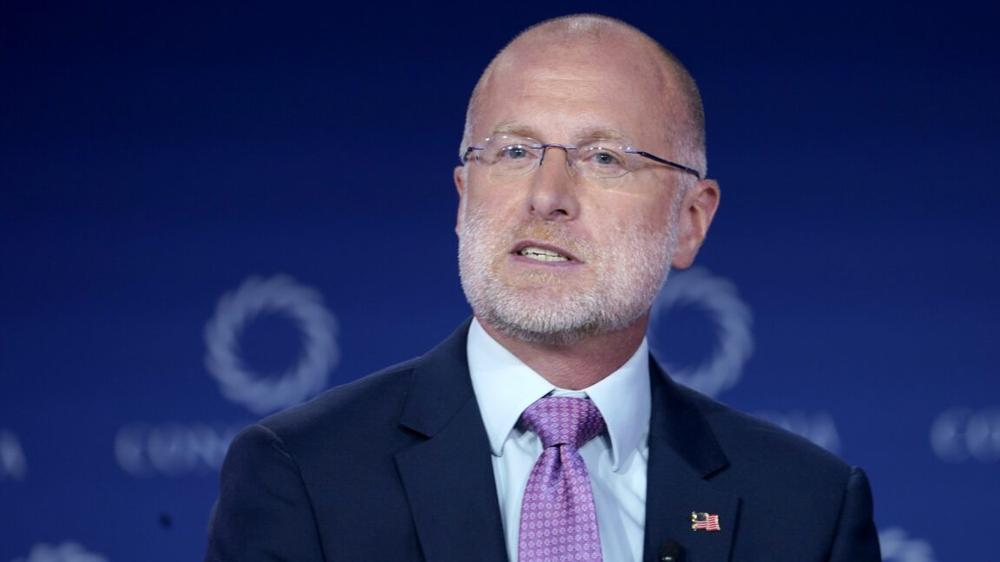Federal Communications Commission Chairman Brendan Carr wants you to know that he never threatened to revoke TV licenses if Disney refused to suspend Jimmy Kimmel. The problem for Carr is that lots of people heard him do exactly that last week.
"There's a lot of Democrats out there that are engaged in a campaign of projection and distortion," Carr said during an on-stage interview at the Concordia Summit yesterday. "The distortion is they're completely misrepresenting the work of the FCC and what we've been doing. I saw there's a letter from some Senate Democrats that said the FCC threatened to revoke the license of Disney and ABC if they didn't fire Jimmy Kimmel, and that did not happen in any way, shape, or form."
While Carr complained that Democrats interpreted his comments as a threat to Disney, he didn't mention that his comments were also interpreted as a threat by several prominent Senate Republicans. Disney suspended Kimmel's show last week after Carr said ABC affiliates could have licenses revoked for "news distortion," but reinstated Kimmel yesterday after facing backlash from the public. Kimmel will be back on the air on many ABC-affiliated stations, but not those run by Nexstar and Sinclair, which have replaced Jimmy Kimmel Live! with news and other programming.
According to Carr's version, he did nothing more than describe a potential process in which the FCC would adjudicate hypothetical complaints in which local TV stations allege that Disney committed news distortion. Carr, who apparently reacted to Kimmel's suspension last week by sending a GIF of TV characters doing a celebratory dance to a journalist, yesterday described his role at the FCC as that of a dispassionate arbiter.
"What I've been very clear in the context of the Kimmel episode is the FCC, and myself in particular, have expressed no view on the ultimate merits had something like that been filed, what our take would be one way or the other," Carr said. "But one of the things we're trying to do as a general matter at the FCC is to empower local TV stations to serve the needs of the local communities."
Carr’s selective memory
Carr has repeatedly threatened to punish companies that violate the FCC's 1960s-era news distortion policy, even though the FCC apparently hasn't made a finding of news distortion since 1993.
What Carr said yesterday has some resemblance to parts of what he said last week. Carr did discuss the process in which the FCC would adjudicate hypothetical complaints regarding Kimmel, who angered conservatives by saying that "the MAGA gang [has been] desperately trying to characterize this kid who murdered Charlie Kirk as anything other than one of them."
But Carr omitted other parts of last week's comments in which he said, "We can do this the easy way or the hard way," and that Disney must "take action" on Kimmel "or there's going to be additional work for the FCC ahead." Carr explicitly urged TV station owners to refuse to air Kimmel and said that stations airing Kimmel could lose their licenses. Carr described Kimmel's monologue as "some of the sickest conduct possible."
Here's what Carr said last week on right-wing commentator Benny Johnson's podcast:
There's actions we can take on licensed broadcasters and, frankly, I think it's past time that a lot of these licensed broadcasters themselves push back on [NBC owner] Comcast and Disney and say, "Listen, we are going to preempt, we are not going to run Kimmel anymore until you straighten this out because we, the licensed broadcaster, are running the possibility of fines or license revocations from the FCC if we continue to run content that ends up being a pattern of news distortion." Disney needs to see some change here, but the individual licensed stations that are taking their content, it's time for them to step up and say this garbage isn't something that we think serves the needs of our local communities. This status quo is obviously not acceptable where we are.
Carr might convince some people to reject the evidence of their eyes and ears, but Sen. Ted Cruz (R-Texas) probably isn't one of them. Cruz slammed Carr on his podcast, and even did an impression of Carr's "easy way or the hard way" comment in a stereotypical mafioso voice while describing the obvious threat as "right outta Goodfellas."
Sen. Rand Paul (R-Ky.) told NBC's Meet the Press that Carr threatening Disney was "absolutely inappropriate," and that "Brendan Carr has got no business weighing in on this." Sen. Mitch McConnell (R-Ky.) posted on X that "my colleague, Ted Cruz, said it looked just like Goodfellas. As a First Amendment guy myself, I think he's probably got it right. You don't have to like what somebody says on TV to agree that the government shouldn't be getting involved here."
“A fairly explicit threat to punish Disney”
Legal experts at the libertarian Cato Institute and the right-leaning American Enterprise Institute (AEI) also described Carr's comments as a threat. "It's hard not to read [Carr's statement] as a fairly explicit threat to punish Disney if they didn't take Jimmy Kimmel off the air, and that's exactly what ABC did very shortly thereafter," said Thomas Berry of the Cato Institute. The AEI's Daniel Lyons described the Kimmel suspension as "part of a long, unfortunate FCC tradition of 'regulation by raised eyebrow,' where informal threats shape media behavior without formal action."
While government coercion of private companies can violate the First Amendment, TV station owners are free to make decisions about what content they air. Carr described what happened with Disney as organic pressure from station owners who are frustrated by the increased power of Disney and other national programmers.
"Local TV stations for the first time in a long time stood up and said, 'We don't want to run that program,'" Carr said yesterday, contending that "Disney on its own made the business decision not to have him air for some period of time."
The protests are coming not from individual stations but from two large companies that own dozens of stations: Sinclair and Nexstar. Both companies said they would not air Kimmel's show upon its return but would continue discussions that might eventually bring Kimmel back to their stations. "Sinclair is the largest owner of ABC stations, with 38 across the country," while "Nexstar operates 28 ABC affiliates," The Hollywood Reporter wrote today.
The show goes on
Carr yesterday said he wants to help TV station owners shift the balance of power in their relationships with Disney and other national programmers like Comcast and Paramount. "What's happened over the years is those national programmers have exerted more and more control and pressure on the local TV stations, so they don't feel like they can push back" over which content "makes sense for the local communities," Carr said.
Elsewhere in the country, Kimmel's show will go on. "Unlike Nexstar and Sinclair, most local TV groups have raised no objections to Mr. Kimmel's show. Gray and Hearst, also large owners of ABC affiliate stations, are planning to run Jimmy Kimmel Live! on Tuesday night as scheduled," The New York Times wrote.
Nexstar is trying to complete a $6.2 billion purchase of Tegna and needs the FCC to relax its ownership cap rule. If Carr's FCC approves, that would help station owners create bigger conglomerates. Sinclair, which is known for its conservative broadcast segments, has smaller deals pending before the FCC.
Anna Gomez, the only Democrat on the Republican-majority FCC, said last week that "billion-dollar companies with pending business before the agency" are "vulnerable to pressure to bend to the government's ideological demands." In a statement yesterday, Gomez said she is "glad to see Disney find its courage in the face of clear government intimidation. More importantly, I want to thank those Americans from across the ideological spectrum who spoke loudly and courageously against this blatant attempt to silence free speech."

 The Best PC Power Supply: Top PSUs for Your Gaming PC
The Best PC Power Supply: Top PSUs for Your Gaming PC